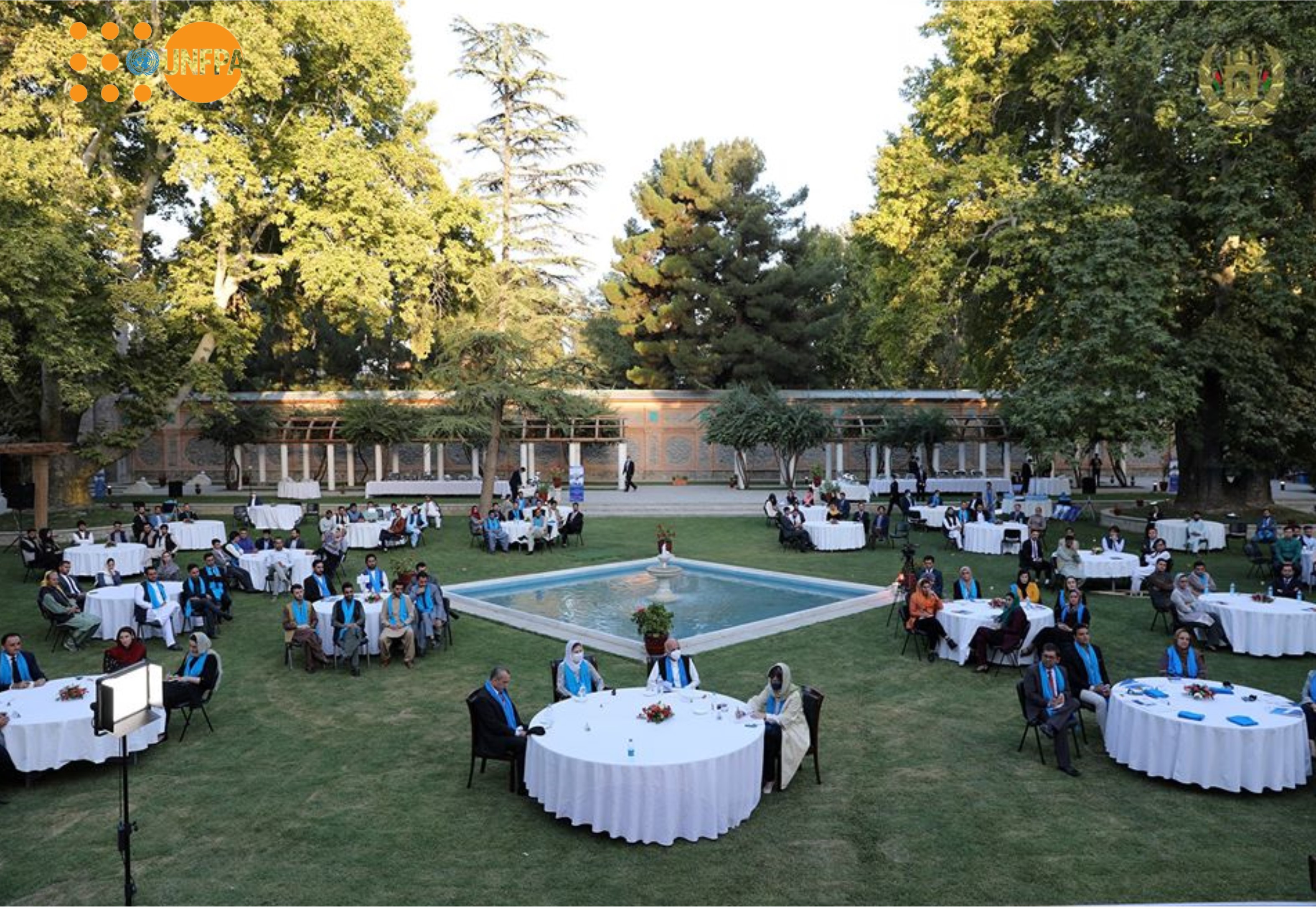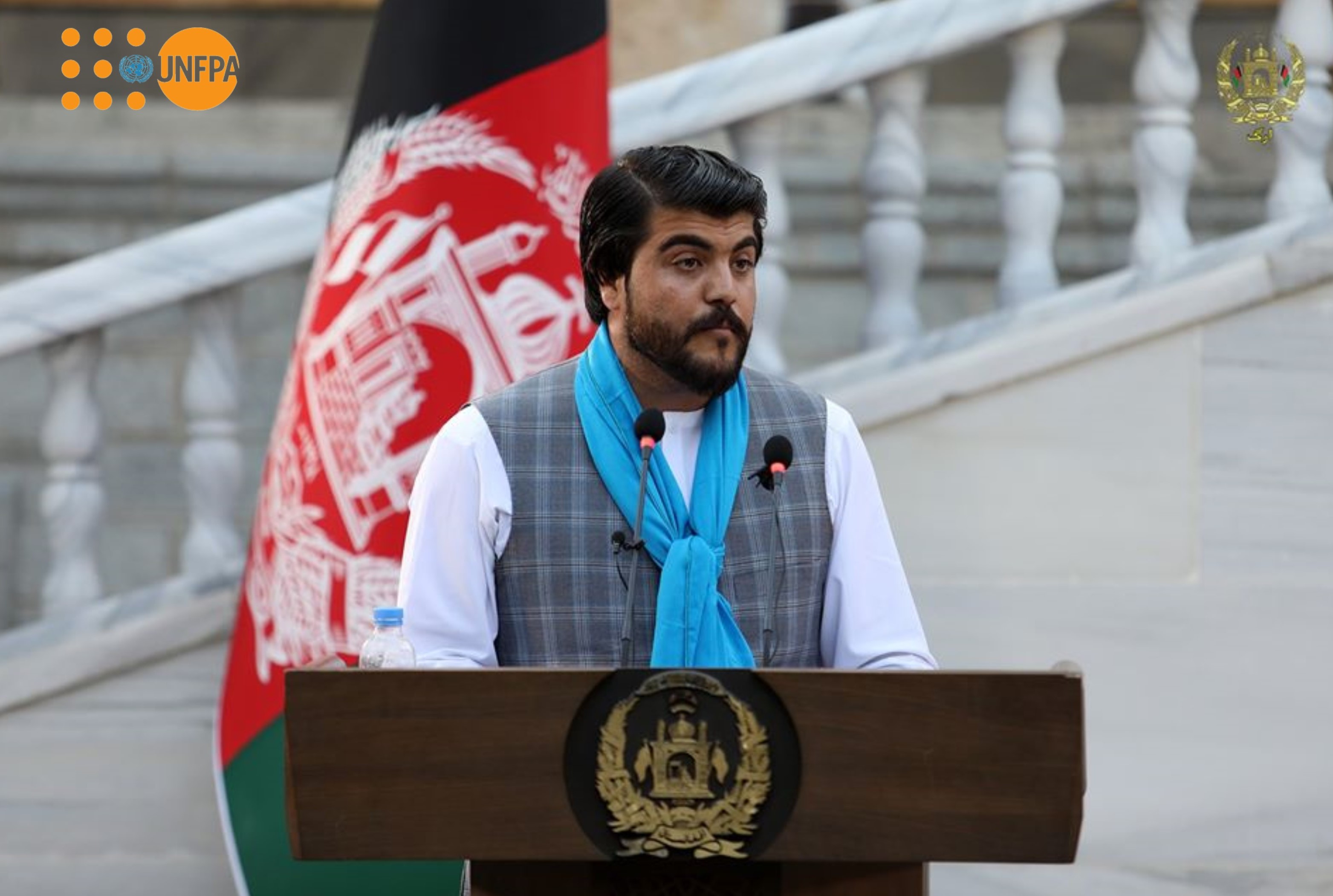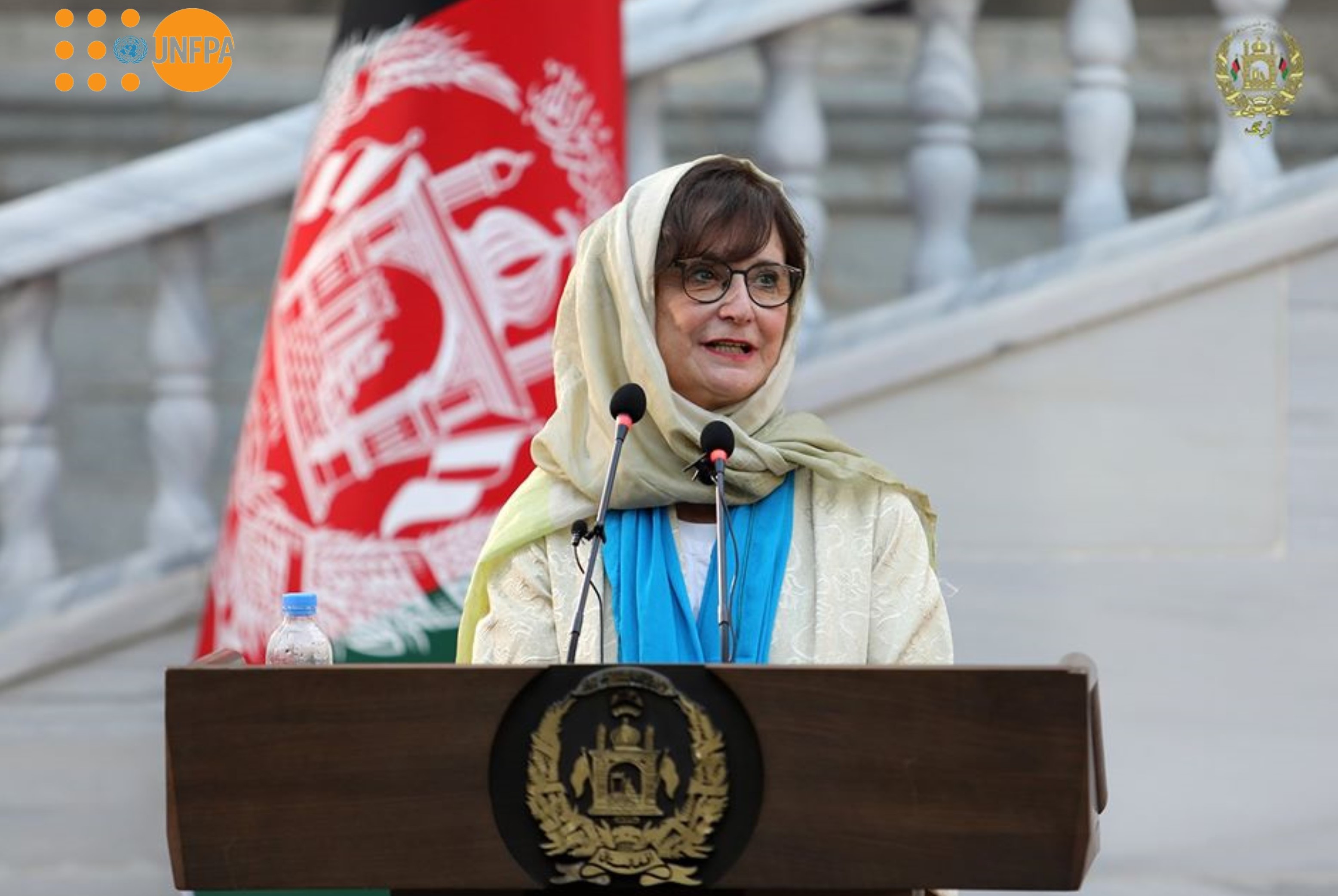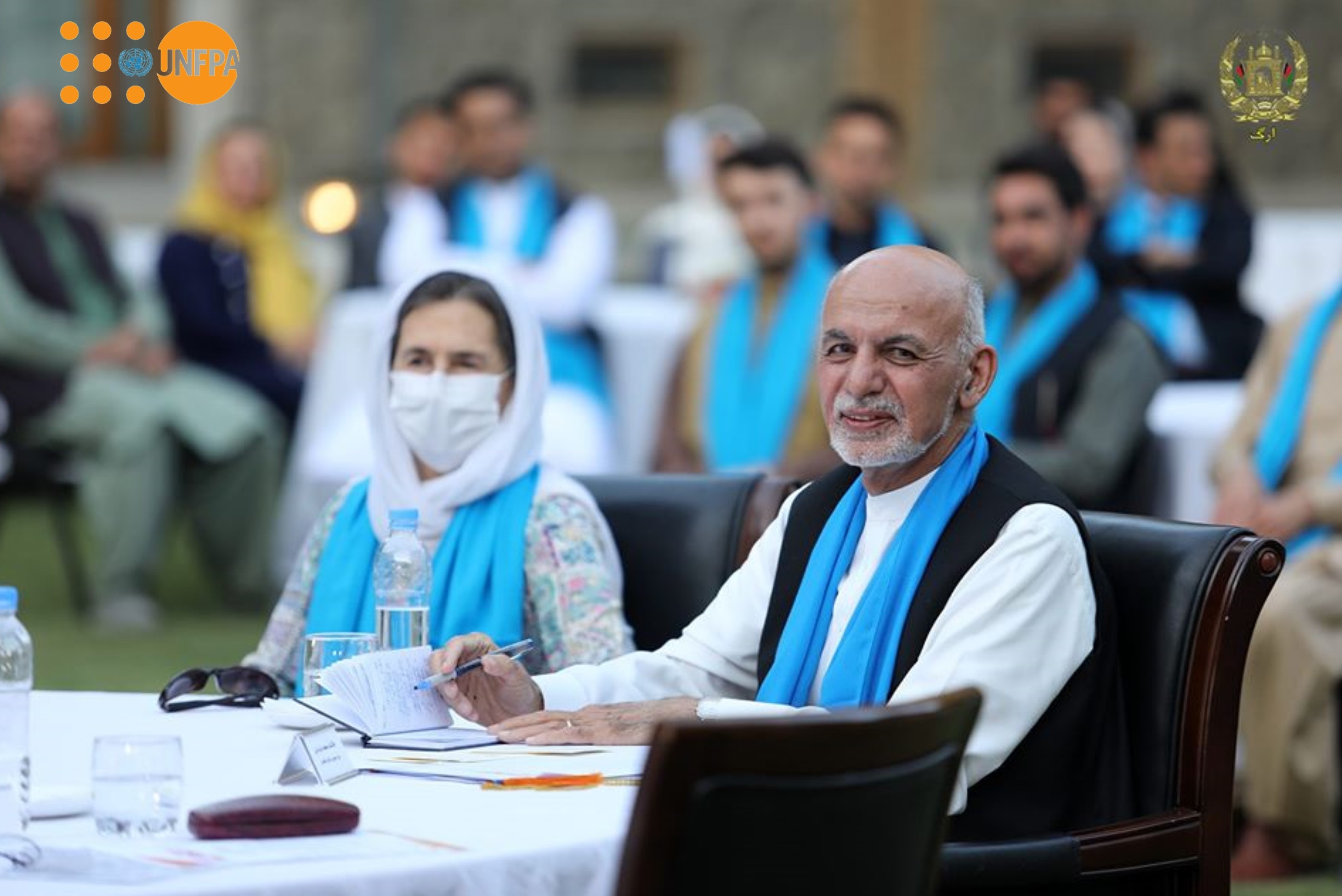Reporting by: Zaeem Abdul Rahman
On 16 Aug 2020, UNFPA Afghanistan, in partnership with the Office of the First Vice President of Afghanistan, and the Deputy Ministry of Youth Affairs, celebrated International Youth Day (IYD) 2020, at the Presidential Palace.
This high-level event was attended by H.E Mohammad Ashraf Ghani, the President of Afghanistan, the First Lady, the First Vice President, the Minister of Women’s Affairs, the Minister of Information and Culture, Minister of Education, Deputy Minister of Youth, as well as Special Representative of the UN Secretary-General (SRSG) Debora Lyons, representatives of UN Agencies and NATO, Embassies and Diplomatic Missions in Kabul. The event was covered by the BBC, Tolo News, and Ariana TVs.

The Minister of Information and Culture, Taher Zaheer, was the keynote speaker for the event. He emphasized the need for both the social and political participation of the youth, “The engagement of youth has increased in recent years and we need to prioritize youth-related policies in order to empower greater youth participation.”.
Within the structure of the Ministry of Information and Culture, UNFPA Afghanistan supports the Deputy Ministry of Youth Affairs in the formulation and implementation of the Afghanistan National Youth Policy and Strategy, as well as providing other technical and capacity building opportunities for the department.
During the event, Nagina Safi, a youth activist, talked on behalf of the youth participants. During her speech, she thanked the Government of Afghanistan and partners for mobilizing more opportunities for youth, particularly young women. Echoing the Minister of Information and Culture, she added that political participation is very important for youth as well. “Afghan youth are faced with challenges in education, employment, safety and security”, she said. “However, youth participation in policies and decision making will contribute to addressing many of these challenges. Engagement and participation of youth is key for the Afghan Peace Process and cannot be ignored.”
Safi’s message was supported by Qadeer Muslim, a youth representative from the remote district of Balamughab in Badghis Province. “Youth participation needs to be guaranteed through an effective and proper system with the aim of ensuring that all young people, from all parts of the country, have equal access and opportunity.” Since 2002, great strides have been made in regard to youth participation in Afghanistan. However, young people’s right to participate in the formal decision-making processes and in social, economic, environmental, and political institutions still remains limited. Indeed, their potential, as an untapped and valuable resource on the path towards sustainable development, is often not recognized.

The SRSG, Debora Lyons, expressed that it was her privilege in being able to attend the high-level event on the occasion of IYD. She remarked upon the commitment to youth represented by the fact that the leadership of the Government of Afghanistan, diplomatic missions and the UN had all joined youth from different parts of the country on this auspicious day to discuss youth-related issues. SRSG Lyons highlighted the support of the UN for Afghanistan during the ongoing pandemic. “Despite COVID-19, UNFPA and the UN, through our work, have continued to see midwives and healthcare providers on the frontline of health work ensuring the care for mothers, newborns, children, and others,” she said. “Through UNFPA, our Community Midwife Education programme has continued to train young women in the remote villages of Herat, Ghor, and Daikundi provinces. Our Family Response Unit workers have kept their doors open to support survivors of Gender-Based Violence”. SRSG Lyons emphasized that the UN supports Afghan youth under all and any circumstances and will ensure their full potential is achieved.

H.E. President of Afghanistan shared his congratulations for IYD and stressed that the youth are the future leaders and managers; they are not marginalized anymore and they are at the core of decisions. He emphasized the active participation and engagement of the youth and expressed that, with learning and experience, the youth will become leaders. He also called on the youth to spend time on learning so that they may increase their knowledge and experience.
“Peace in Afghanistan is our top priority, but beyond that, we are empowering the economy of the country, fighting against COVID-19, streamlining our governance, and establishing the rule of law”, H.E President Ghani stated. “Youth networks need to be activated in all the districts, and dialogue needs to be advanced in the universities. This will increase youth engagement and realize the real participation needed.” H.E President of Afghanistan showed enthusiasm for the prosperity of the country and expressed that the current youth generation of Afghanistan would end the inherited crises of the country, because the role and participation of youth in politics, decision making, and formulation of policies has increased.

Additionally, H.E President Ghani highlighted a number of key points during his speech that included: 1) Youth Leadership in line with the modern leadership expected from the young leaders of the 21st Century, 2) Youth management capacity in line with the expectation of current modern management and relevant technological advancements, 3) Youth learning and higher education and the building of competencies based on experience as opposed to only institutional learning, 4) Youth participation in social mobilization and change from the individual to the family unit which will grow to affect societal and country-level change, 5) Youth participation in the peace and development agendas, and 6) Regular and increased consultations to be held with youth.
Afghanistan has one of the youngest and fastest-growing populations in the world – with approximately 67 per cent of the entire population being under the age of 25. Young people in Afghanistan face significant challenges related to health, education, employment, and gender inequality.
UNFPA is committed to supporting the Afghan Government and its people, especially the youth, in harnessing the demographic dividend. Development of youth and adolescents’ is a key programmatic area of the UNFPA Afghanistan Country Programme and the country office works with the Government of Afghanistan and partners to ensure the participation of youth and achieve their full potential.

